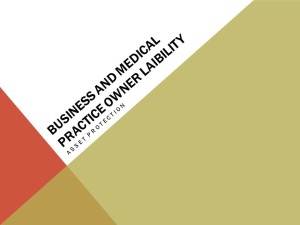 The many discussions we have shared here have largely centered on asset protection and other legal and financial issues faced by physicians and business owners. The bulk of those discussions assumed that you own or run a business or medical practice. Due to the growing availability of financial and legal education resources available to business owners, doctors and practice managers and the increasingly demanding and onerous nature of the medical business I’m seeing something encouraging as an attorney: Doctors are starting to get serous about the business side of their practices.
The many discussions we have shared here have largely centered on asset protection and other legal and financial issues faced by physicians and business owners. The bulk of those discussions assumed that you own or run a business or medical practice. Due to the growing availability of financial and legal education resources available to business owners, doctors and practice managers and the increasingly demanding and onerous nature of the medical business I’m seeing something encouraging as an attorney: Doctors are starting to get serous about the business side of their practices.
I’m increasingly working with not only the seasoned practice owner or physician with a substantial and hard-earned net worth we’ve always worked with, but also young doctors ready to start their own practices and ready to learn and implement strategies that will help them build their practice and family wealth in a predictable way. This discussion could easily fill a book, but we will begin here and help you identify key issues and questions to help get you started on you way or consider issues that need to be refined in your existing practice.
Step One: Understand When and Where Your Legal Liability Begins
In most cases it starts before you even open the doors. Make sure you have a good handle on your personal overhead and existing debt obligations when creating your business plan and projecting start-up capital costs. Remember that you have bills to pay yourself and you must be able to meet both your business and personal overhead commitments for an extended period of time while your insurance contracting and billing cycles get ramped up. Many experts advise planning for 90 days to 120 days for revenue to actually begin cycling back to your practice at start up.
Understand clearly the nature of the debt you are incurring and what you are signing, whether for real estate or for a start-up credit line in some form. If buying real estate with partners make sure that the debt obligation is limited to your proportional ownership, and that you are not “jointly and severally liable” for the entire amount of the debt in one big pool. As an example, if you are going to own only 25 percent of the legal entity that owns the building, make sure you are only personally guaranteeing 25 percent of the debt. Likewise, if collateral is required for such financing, make sure the collateral you contribute is similarly structured as well; don’t provide an asset or full claim to an asset that has a value greater than your fractional ownership of the debt.
Relying on any promises or agreements not explicitly in the written agreement between the borrower and the bank is fatal. Even if you have a written agreement with your partners or in your partnership’s operating agreement that says you share debt and liability as owners, the bank will almost never be party to that agreement or bound by it in any way. They will collect on the obligation to the letter of the law and the contract in the event of a default. Consult with independent counsel that represents you only, do not rely on the representations of the attorney that works for your “group” if joining a new practice or starting a new one with partners. That attorney has a client and it is the corporation itself (or worse, their buddy who hired them) in most cases, not you.
Use your attorney’s counsel to determine the exact dollar amount of your personal guaranty liability. If you are married, consider this number carefully and make sure you understand the nature of the effect of this debt on your spouse and whether it affects your community property. Never “bet the farm” without checking with your husband or wife. Wherever possible we also advise language that specifies the debt is the sole responsibility of the physician or practice owner spouse.
Finally, figure out what assets you have that are currently exposed. This number can almost always be reduced and there are basic asset protection measuresthat can be part of nearly everyone’s legal planning regardless of net worth.
As always, the information presented here is general and educational and can never replace the advice of experienced counsel specific to your assets or situation. Another version of this article originally appeared at www.PhysiciansPractice.Com where Ike Devji is a regular contributor, and is reprinted here with permission.


